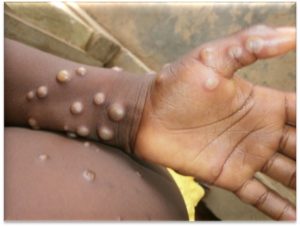Monkeypox: 5 Things You Need to Know
By • July 25, 2022 0 2080

With Covid still lingering in the news and new variants appearing seemingly every other day, it’s hard to grasp yet another virus appearing in our vernacular. But this time, it’s monkeypox.
To make things easier, here are five things you need to know about this rare, but potentially serious viral illness.
1. Monkeypox does not come from monkeys. – The reason the virus is called monkeypox is because it was first isolated from a monkey in Africa. The reservoir for it is actually in rodents, mostly from Central and West Africa. Monkeypox has been around for decades and is a cousin of smallpox (its symptoms are very similar). Most of the time, it causes a mild illness — most don’t end up hospitalized. A less severe strain from West Africa seems to be the one currently causing the outbreak you hear about on the news.
2. Its symptoms include many that happen with other viruses. – Symptoms of monkeypox include headaches, a fever and chills, muscle aches, swollen lymph nodes, exhaustion and a rash that resembles pimples or blisters. The rash can appear on your face, inside your mouth and on other parts of your body. The illness usually lasts two weeks to one month and those who catch it will unfortunately need to isolate until their rash scabs over and a fresh layer of skin forms. While it doesn’t usually require hospitalization, it’s highly contagious, uncomfortable and can often times be very painful for those who have it.

A victim’s Monkeypox rash. Courtesy Nigeria Centre for Disease Control.
3. It’s spread the way most viruses are. – According to a press release from D.C. Mayor Muriel Bowser’s office, monkeypox is transmitted from person to person through direct contact with the rash that appears as the virus runs its course, scabs and/or bodily fluids. It’s often spread through intimate physical contact. It also can be spread by respiratory secretions and lengthy face-to-face contact. It can also be transmitted through bedding and towels used by a person with the virus.
4. The District’s response. – D.C.’s response to the virus has been swift. According to the mayor’s office, the District has received 8,300 doses of the JYENNOS vaccine and has given 2,600 shots and counting. Those who are currently eligible to receive a monkeypox vaccine must be a D.C. resident, age 18+ and must meet the following criteria:
- Gay, bisexual and other men who have sex with men and have had multiple or any anonymous sexual partners in the last two weeks; or
- Transgender women or nonbinary persons who are assigned male at birth who have sex with men; or
- Sex workers of any sexual orientation or gender; or
- Staff of any sexual orientation or gender at places where sexual activity occurs like saunas, bathhouses and sex clubs.
5. Should Georgetowners worry? – Georgetowners shouldn’t fret, but they should remain on alert. According to The Washington Post, D.C. leads the nation in monkeypox cases per capita. A letter dated June 22 from Dr. Ranit Mishori, M.D., MHS, FAAFP, a professor of family medicine and president and chief public health officer at Georgetown University informed the community of a presumptive case of monkeypox. The community member is living off campus near the school’s main campus and was reportedly in isolation and doing well.
You can learn more about monkeypox by visiting the CDC’s website on the virus here.

